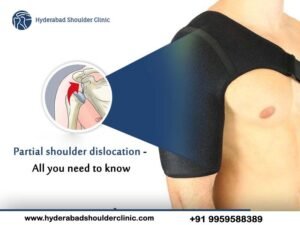In almost all cases, the shoulder surgeon would instruct you to wear a sling after shoulder surgery. By using the sling, you will limit your shoulder’s range of motion so that the surgical site can fully integrate and heal. In some cases, the repaired area must be protected carefully, so your arm might be wrapped in a sling along with a pillow tied around your waist. Wearing a sling as recommended by the surgeon after surgery is very important.
- After surgery, a sling is usually worn for 4 to 6 weeks.
- It would be best to not involve yourself in any activities like lifting, pushing, or pulling objects with your operated shoulder in the first 6 weeks after surgery.
- The operative arm should not be used to reach behind the back.
- You may need to remove the sling to perform activities like bending and straightening your elbow and manoeuvring your fingers multiple times a day.
- You can take off the sling to shower, dress, and do elbow range of movements.

Your Diet
Drink more water with electrolytes soon after the surgery because anaesthesia and medications given during the surgery tend to dehydrate the body. On the evening of your surgery and the next day, we recommend eating a light diet. As soon as you feel comfortable, you can return to a regular diet.
Pain Management
You will receive instructions about pain medicine when you are discharged from the hospital. You may need to take this pain medicine as prescribed by the doctor. If the pain doesn’t go away even after taking medicine, consult your doctor.
Ice Therapy
You can purchase a cold pack machine, or you may use ice bags or ice wrapped in soft cloth to ice your shoulder. It provides relief from pain and swelling following surgery.
- After surgery, it is recommended to ice your operated shoulder for the first 48-72 hours.
- During the first week after surgery, you should ice your shoulder two to three times a day, particularly before going to bed.
- We may also recommend placing a soft cloth or a thin towel between your arm and the sleeve so that it protects your skin from damage.
Caring for Your Surgical Incision
- Unless you have a pain catheter, you can remove the dressing and shower after 48 hours following surgery. In the case of biceps tenodesis surgery, it is recommended to wear your dressing for five days following the procedure.
- The pain catheter should be removed by one of your family members along with the dressing before showering if you are at home.

- You should not soak the incisions in water for at least six weeks, but you may shower and allow the water to flow over them. Incisions should be wiped dry afterwards. The incisions do not require any ointment unless suggested by the doctor.
- Consult the doctor immediately if you observe any drainage from the incisions, swelling, or increased pain even after five days post-surgery.
- There is no need to worry if you notice redness around your incision. However, if you notice redness and drainage or redness that spreads away from the incision along with fever, consult your doctor.
Sleeping
Following rotator cuff surgery, you may have difficulty sleeping for a week or two. Moreover, many patients experience pain when lying flat on their back following shoulder surgery. Dr Chandra Sekhar, one of the leading shoulder surgeons in Hyderabad Hyderabad, recommends sleeping in a reclined position in bed after surgery. You can place a pillow between your arm and body and behind the elbow to make sure your arm is slightly placed away from the body. Better wear the sling while sleeping.
Physical Therapy
A physical therapist decides when to prescribe physical therapy and when to begin these exercises for each patient. During the first postoperative visit, you will discuss these with the physical therapist. However, the surgeon instructs to start a gentle range of motion exercise on the same day of surgery. They might be self-directed exercises, and you will be instructed on what to do and how to do it on your own.
Healing and Recovery
Compared to other tissues in your body, tendon tissues heal much more slowly. For instance, a cut on your skin usually heals within seven to ten days. The tendon tissue in the rotator cuff, however, takes around three months to heal. Overall, a person usually needs two to three more months to recover fully.

A shoulder dislocation usually heals in 12-16 weeks or even depending on the severity of the condition. A fracture may take even longer to heal completely.
Based on the problem, shoulder strength may be affected. The main goal of shoulder surgery would be restoring a pain-free and functional shoulder. However, the quality of recovery and the time taken to recover from shoulder surgery depends on many factors, from age to the patient’s general health.
In general, 90% of patients who undergo rotator cuff repair and shoulder surgery are satisfied with the outcomes and experienced significant reductions in pain and improved shoulder functions following the procedure. If you are experiencing any shoulder pain, consult Dr Chandra Sekhar, one of the best orthopaedic shoulder surgeons in Hyderabad. He has more than 15 years of experience handling a wide range of shoulder problems and is an expert in shoulder joint replacement surgery.





